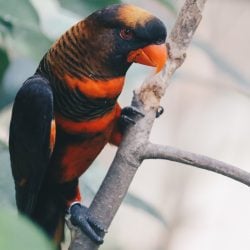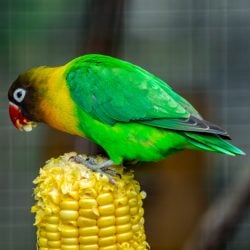Last Updated on by Mitch Rezman
We talk about parrots being equatorial animals and how life in North America, for example, screws up their instinctual expectations for things like light cycles and temperature.
So you would think with summer here, all those problems would go away. Some do, but now we face a host of new challenges.
Escape routes
Summer is the time of open doors and windows, screens instead of glass, and much more in and out traffic typically.
Flighted birds pose the risk of escape by flight, and summer increases that risk no doubt.
But when your wing clipped 240g feather ball chews through the screen where you left the window open in the guest room on the second floor, your clipped wing bird could easily ride the warm summer thermals (those air things that keep non-motorized gliders afloat) and end up in the next state before you knew she was gone.
If you open doors and windows, it’s best to keep your bird in a cage, flighted, or not.
A wire travel carrier or small cage is an easy and simple choice.
Cooling Fans
A fan can be a human’s best friend. I’ve seen videos of birds who like to play in the airflow. That said, I have also seen birds who were placed under or in front of a fan with every good intention by its keeper.
While keeping the air around the bird cool the bird’s feathers were always getting lifted.
A “ruffled” feather needs to be put back in its place, and this is done by preening.
With the unceasing airflow from the fan comes with an unceasing amount of preening, which has in the past triggered plucking.
I advise you to keep your birds out of the path of a direct fan or AC airflow.
Ceiling fans fall under the category of super hazard for flighted birds.
Veterinarians call the result “shredded tweet” For more ways on how we kill our pet birds, read this.
Shade
We talk about the need for full-spectrum lighting on a regular basis.
What could be better than the real deal, the sun?
You know that thing that can cause paint, burned skin, crinkle car interiors? Yep, that sun.
Sunlight is good, direct sunlight is not – make sure your bird always has access to shade.
If your cage is near a window check it throughout the day to make sure there is always a shady spot somewhere in the cage where your bird can seek refuge from the sun.
Mosquitoes
West Nile virus is usually transmitted through mosquito bites and it’s an avian condition that could result in death. Keep your bird protected from mosquitoes.
If you take him or her outside in a cage outside on an unprotected deck, potential exposure of your bird to mosquito bites greatly increases. An outdoor aviary may require an additional layer of screening.
Burning the burgers
Grilled food always tastes better, who doesn’t like a good barbecue?
Whether the barbecue is at home or your bird travels with you remember the smoke from campfires and barbecues may be toxic to your bird.
Check to see that direct inhalation is not occurring through an open window, or screen door too.
The varments
For us, the circle of life usually starts at the supermarket and ends at our kitchen table.
For a feral cat, a raccoon, or a nearby Hawk, the circle of life can be seconds away from your bird’s cage when parked out of doors.
Please don’t leave your bird alone outside for a moment.
Written by Mitch Rezman
Approved by Catherine Tobsing
Author Profile
Latest entries
 Bird BehaviorJune 26, 2025How is it Parrots Are Problem Solvers Social Animals and Even Use Tools?
Bird BehaviorJune 26, 2025How is it Parrots Are Problem Solvers Social Animals and Even Use Tools? Bird & Parrot AnatomyJune 25, 2025How a Tiny Chemical Modification Makes Parrots Nature’s Living Paintings
Bird & Parrot AnatomyJune 25, 2025How a Tiny Chemical Modification Makes Parrots Nature’s Living Paintings PigeonsJune 20, 2025How Do Parrots Thrive in Cities Outside Their Native Habitats?
PigeonsJune 20, 2025How Do Parrots Thrive in Cities Outside Their Native Habitats? Feeding Exotic BirdsJune 20, 2025Is Corn On the Cob Safe for Pet Birds?
Feeding Exotic BirdsJune 20, 2025Is Corn On the Cob Safe for Pet Birds?




